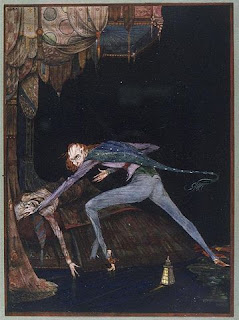Ian Fleming mentions Poe three times in the Bond novels. There is one reference in Moonraker (1955); Fleming compares the ominous ticking inside the Moonraker rocket before launch to “the beating heart in Poe's story” (probably 'The Tell-Tale Heart' (1843), in which “the beating of the old man's heart...increased my fury, as the beating of the drum stimulates the soldier into courage”).
 |
| An illustration from 'Tell-Tale Heart' |
But there is another allusion to Poe. In his 1842 story, 'The Mystery of Marie Rogêt', in which the detective C Auguste Dupin investigates the unsolved murder of Marie Rogêt, the unnamed narrator is subjected to a series of tests on the matter of dreams. At one point he states that “when one dreams, and, in the dream, suspects that he dreams, the suspicion never fails to confirm itself, and the sleeper is almost instantly aroused. Thus Novalis errs not in saying that 'we are near waking when we dream that we dream.'”
 |
| An illustration from The Mystery of Marie Roget |
The idea is an attractive one, and interestingly Fleming isn't the first novelist to allude to it. For instance, in Jules Verne's 1897 novel, Le Sphinx des Glaces, which imagines that Poe's 1838 novel, The Narrative of Arthur Gordon Pym of Nantucket, is a true account of a voyage to Antarctica, the protagonist Mr Jeorling describes how he “dreamed that I was dreaming,” continuing that “when one suspects that one is dreaming, the waking comes almost instantly.”
The references to Edgar Allan Poe in the Bond novels confirm that Ian Fleming was familiar with the writer's work. Possibly the young Ian listened to Poe's stories, along with those of Buchan and Rohmer, at Durnford School. But wherever and whenever Fleming read the stories, they stayed with him, and it is inevitable that the ideas within them would re-emerge in Fleming's own work.

No comments:
Post a Comment
Note: only a member of this blog may post a comment.